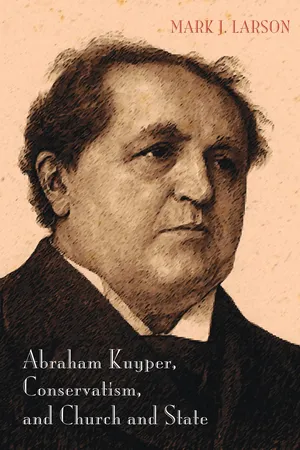![]()
1
Conservatism
The dominant charismatic figure in American conservatism in the twentieth century was Ronald Reagan. He burst upon the national scene on October 27, 1964 in his televised speech in support of the Republican presidential nominee Barry Goldwater. In that address, Reagan articulated the principles of political conservatism. More than that, “he stepped into history,” becoming a major figure in the nation’s political life.
Reagan was larger than life, “an apostle of full blown political and economic conservatism.” He embodied the conservative political tradition that had been affirmed by such American intellectuals as Russell Kirk and William F. Buckley.
The antipathy toward Reagan on the part of contemporary disciples of Abraham Kuyper is revealing. Today, many Kuyperians are politically liberal. The left-leaning positions of contemporary Kuyperians were reflected in the Reformed Journal. Readers in the 1980s would have drawn the conclusion that followers of Kuyper despised Ronald Reagan. The leftward orientation of contemporary Kuyperians is telling. It is compelling evidence of a significant departure, a drifting away from the fundamental political principles that Kuyper advocated.
Kuyper was a champion of political conservatism. He stood in the trajectory of core conservative principles affirmed by Edmund Burke and more recently by Ronald Reagan. This thesis will be set forth by way of two major arguments. We shall first consider what conservatism is in terms of a general explanation. On this point, we shall see that Kuyper may be regarded as a forerunner of American conservatism. We shall then demonstrate by looking at the specifics that Kuyper’s political thought is structured in continuity with the core tenets of contemporary conservatism in the United States.
In this connection, we shall consider three fundamental concerns of conservatism: its emphasis upon God and the moral order, its stress upon the necessity of limited government, and its commitment to the value of freedom.
There is the profound recognition among conservative thinkers, including Kuyper, that God stands above the state and expects compliance with the demands of natural law. Likewise, although the state must provide order to society, it must not dominate the people, trampling them underfoot, and taking freedom from them.
Tradition and Reform
Let us now turn our attention to a general portrait of conservatism as a political philosophy, noting that Kuyper was prototypical of conservatism in America. We begin by acknowledging that political conservatism is a recent phenomenon in the long history of political thought. Conservatism arose as a response to the fanaticism and utopian excesses of the French Revolution. The English word conservative comes from the French term conservateur. The conservateur in France wanted conditions to return to the way they were before the French Revolution. He was “the guardian of the heritage of civilization and of the principles of justice.” The French conservateur in the days following the defeat of Napoleon appreciated the political ideas of the British statesman Edmund Burke who affirmed a “politics of prudence and prescription, guarding and preserving a country’s institutions.”
It is true that conservatism appreciates tradition. Michael Oakeshott describes this aspect of conservative thought: “To be conservative, then, is to prefer the familiar to the unknown, to prefer the tried to the untried, fact to mystery, the actual to the possible, the limited to the unbounded, the near to the distant, the sufficient to the superabundant, the convenient to the perfect, present laughter to utopian bliss.” This passage nicely expounds upon the conservative bent to honor the valuable insights that come to us from the past. This, however, is only one aspect of the instincts of the conservative mind.
There are times when conservatives demand change and reform. They may express the desire to overturn the status quo, to return to an older and better tradition that has been elapsed in the state and in society. Change is legitimate in conservative thinking, but it must be prudent change, “gradual and discriminatory.” “Sudden and slashing reforms are as perilous as sudden and slashing surgery.” The conservative thus has an antirevolutionary perspective on life.
This then is the prevailing attitude of conservatism. In America there is great respect for our political principles as embodied in the Constitution. American conservatives believe that “they are the gifts of great men of old.” Thus there is the desire to maintain and defend the good things of the past. At the same time there is within the conservative soul a desire to restore the good things that have fallen by the wayside. Such a restoration is not merely a complete duplication of what has happened in the past. History moves forward in its growth and progress. Thus foundational political principles must be applied to a new time and situation.
An American Republican
Is it really the case that Abraham Kuyper ought to be ranked as one of the charismatic giants of political conservatism? How can this be maintained when he rejected the Dutch Conservative Party? We must here keep in mind the reason for this. The Conservative Party in the Netherlands was “little more than the moderate wing of Libe...
